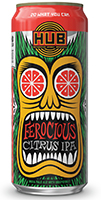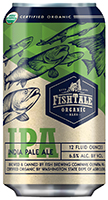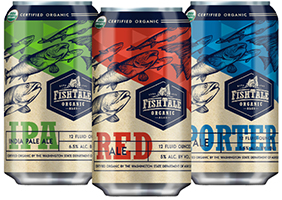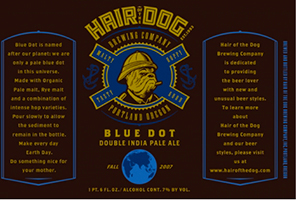 You’re doing your part. You’re engaged. You’re recycling all your craft beer bottles and buying free-trade coffee and composting your dryer lint and flipping off KFC and always showering with a friend because hey, you actually care about conserving water, mostly. Studies are showing that more Americans really are paying more attention to ingredients and labels, seeking out essential keywords like “organic” and “all natural” and “healthy,” hoping that they actually mean something. Some craft breweries are doing their part, too. We don’t know if they’re showering with friends, but some are organically brewing — in part or as a whole. Organic brewing differs in only a few details from that at a conventional operation; for example, organic standards forbid brewers from adjusting the pH of his or her water with phosphoric acid, which many brewers use, so they rely on lactic acid instead. The big distinction is of course the necessity for organic ingredients. “Organic” products must contain at least 95 percent organically produced ingredients and processing aids are used (i.e. no chemicals or pesticides). The remaining ingredients must be proven not to be available in organic form in the quantity and quality needed for the product. The non-organic ingredients must be included in the USDA’s National List of Allowed and Prohibited Substances. At present, hops usually comprise the non-organic component of certified organic beers, because some varieties can be hard to obtain in organic form. Whether or not you drink organic beer, we think we can all agree that organic is a noble direction. Peaks and Pints gives a big round of “O”-plause for the efforts of organic breweries and beers in our beer flight today: Craft Beer Crosscut 6.21.17: A Flight of Organic.
You’re doing your part. You’re engaged. You’re recycling all your craft beer bottles and buying free-trade coffee and composting your dryer lint and flipping off KFC and always showering with a friend because hey, you actually care about conserving water, mostly. Studies are showing that more Americans really are paying more attention to ingredients and labels, seeking out essential keywords like “organic” and “all natural” and “healthy,” hoping that they actually mean something. Some craft breweries are doing their part, too. We don’t know if they’re showering with friends, but some are organically brewing — in part or as a whole. Organic brewing differs in only a few details from that at a conventional operation; for example, organic standards forbid brewers from adjusting the pH of his or her water with phosphoric acid, which many brewers use, so they rely on lactic acid instead. The big distinction is of course the necessity for organic ingredients. “Organic” products must contain at least 95 percent organically produced ingredients and processing aids are used (i.e. no chemicals or pesticides). The remaining ingredients must be proven not to be available in organic form in the quantity and quality needed for the product. The non-organic ingredients must be included in the USDA’s National List of Allowed and Prohibited Substances. At present, hops usually comprise the non-organic component of certified organic beers, because some varieties can be hard to obtain in organic form. Whether or not you drink organic beer, we think we can all agree that organic is a noble direction. Peaks and Pints gives a big round of “O”-plause for the efforts of organic breweries and beers in our beer flight today: Craft Beer Crosscut 6.21.17: A Flight of Organic.
 Samuel Smith Organic Raspberry Fruit Beer
Samuel Smith Organic Raspberry Fruit Beer
5.1% ABV
One of the oldest operating breweries in the world, Samuel Smith’s Old Brewery has been brewing with the same derivative yeast strain in the same stone vats for the last 255 years. They even keep a small team of Shire horses — a breed that traditionally pulled brewery wagons — to deliver beer around its hometown of Tadcaster. But for all this tradition, Samuel Smith is remarkably modern. All but one of its beers are vegan and the brewery has an entire line of organic ales, including its Raspberry Fruit Beer. According to Samuel Smith’s, it’s brewed at the All Saints Brewery in Stamford, England using all manually operated equipment. Barley and wheat are combined to make an ale, fermented and aged for an extended period, then taken to Samuel Smith’s brewery in Tadcaster, England. It is at this stage where they blend in pure fruit juice to create a fruit-forward ale with malt and some bittering hops on the back.
 HUB Ferocious Citrus IPA
HUB Ferocious Citrus IPA
6.2% ABV, 40 IBU
Hopworks Urban Brewery in Portland, Oregon, is a family-owned and operated business utilizing organic malts and a combination of locally-sourced, organic and Salmon Safe hops. It was the first Certified B Corporation brewery in the Pacific Northwest, as well as a gold-level bike friendly business. The brewery’s Ferocious Citrus IPA — a tiki version of the yeti from their popular Abominable Winter Ale — is a hazy and crazy IPA showcasing a citrus bouquet from organic hops and grapefruit juice, and brewed with hard red spring wheat from Twin Oaks Farm on San Juan Island to impart some slight haze and a medium-full texture and body to the beer. The hops are not disclosed other than “Organic NW Hops”, but the notes found are very reminiscent of classic “C” hops. A balancing hop character and lingering earthy bitterness leave no doubt that this is still an IPA and not a juice box.
 Fish Tale Organic India Pale Ale
Fish Tale Organic India Pale Ale
6.75 ABV, 42 IBU
Fish Tale Ales expanded their portfolio of organic beers with new cans that reflects Fish Brewing‘s commitment to sustainability and adding two new styles. Organic Porter and Organic Red Ale join the Olympia brewery’s already established organic offering, India Pale Ale. “Cans are recyclable, lighter, chill faster and are often welcome where glass bottles are not, Fish Tale Ales is thrilled to provide its customers the best possible vessel to house our organic series of beers,” says Sal Leone, Fish Brewing’s president. Fish Tale Organic India Pale Ale is brewed with organic pale and crystal malts for a firm malt body to balance an assertive hop profile featuring organic Cascade and Centennial hops grown in the Yakima Valley. The old school IPA drinks bready with toasty malt flavor, some caramel and lots of pine.
 Fish Tale Organic Porter
Fish Tale Organic Porter
5.5% ABV, 40 IBU
The Porter is Fish Brewing’s newest release in their Fish Tale Organic series, which brews with 100 percent locally sourced organic malted barley and hops. It’s an English-style Porter with a satisfying dry finish and rich notes of chocolate. Smooth, dark, and bittersweet cocoa flavors linger on the palate from first sip to last. The result is wonderfully smooth and creamy. Fish Tale Ales popular Olympia brew pup is expanding in the South Sound. A new pub is expected to open at Point Ruston along Tacoma’s waterfront on Labor Day Weekend 2017.
 Hair of the Dog Blue Dot Double IPA
Hair of the Dog Blue Dot Double IPA
7% ABV, 80 IBU
People have been making pilgrimages to Portland for Alan Sprints’ beer since the dark ages — back when hazy and sour beers weren’t made that way intentionally. Hair of the Dog brewed an IPA named after planet Earth with organic Pilsner malt, rye malt and a combo of intense hops. Somewhat pungent in the nose with tons of herbal, floral, citrus grapefruit, raw honey and fresh mint the Blue Dot is a full-bodied, smooth and creamy IPA. Then the hops come to play with a raw leafy coarseness and big smack of grapefruit, ripe pineapple and some sticky resins on the palate. This is all backed by a malt sweetness, touch of honey and a spicy character unique to the addition of rye.
